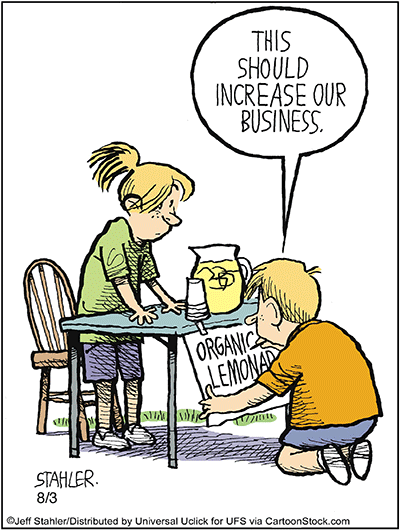
Feature |
Members' Articles |
News |
Events |
Who is who |
Comic
FIND OUT at the end of this Newsletter how the very youngest generations take advantage of the increasing awareness of the benefits of organic production ;-)
Editorial
Dear Newsletter readers,
Can you imagine human faeces and waste contributing to the resilience and sustainability of our food systems? The feature article in this newsletter explains exactly how this is possible. Plus find out more about Sufosec’s first global food and nutrition report, access the recording of a webinar on sustainable groundwater management, and read a review of the functions of soil microbiomes in agroecosystems. You will also find a list of upcoming events and learn more about our newest Section Food Systems team member, Manfred Kaufmann.
I would also like to take this opportunity to say goodbye to you. My traineeship at the SDC is coming to an end and this will be my last newsletter for the A&FS Network. It has been an instructive and inspirational year and I enjoyed interacting with many of you at different stages. I look forward to seeing some of you at one of the network’s upcoming events or on another occasion.
With this, I wish you a Merry Christmas and a Happy New Year!
Kindly,
 Rahel Streuli
Rahel Streuli
Academic trainee, Section Food Systems SDC
LinkedIn | rahelkatja.streuli@eda.admin.ch
Feature
Food security thanks to faeces and waste
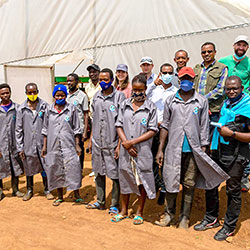
How does human waste increase the resilience and sustainability of our food systems? Together with partners in Ethiopia, Rwanda, the Democratic Republic of the Congo and South Africa, ETH Zurich researchers are creating circular economies that use processed organic waste and human excreta as fertilizer or animal feed, resulting in higher crop yields and new jobs.
Read the full article or watch the video
 World Food System Center, ETH Zurich
World Food System Center, ETH Zurich
LinkedIn | wfsc@ethz.ch
Member Article
Alliance Sufosec launches global food and nutrition report
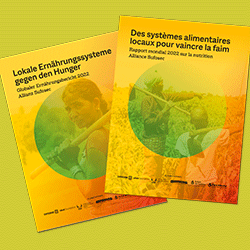 Up to 828 million people worldwide suffer from hunger. The Sufosec Alliance recently presented its first global food and nutrition report during a panel discussion, to show how the six Alliance organizations contribute to achieving SDG 2 Zero Hunger.
Up to 828 million people worldwide suffer from hunger. The Sufosec Alliance recently presented its first global food and nutrition report during a panel discussion, to show how the six Alliance organizations contribute to achieving SDG 2 Zero Hunger.
Read the full article about the panel discussion below or access the Sufosec Report 2022
here.

Thomas Gass
Alliance Sufosec
LinkedIn |
contact@thomasgass.dev
Read the full article about the panel discussion
At a panel discussion on 21 October 2022 in Bern, the Swiss NGO Alliance Sufosec (Sustainable Food Systems and Empowered Communities) presented its first global food and nutrition report. The report shows how the Sufosec member organisations Aqua Alimenta, Fastenaktion, Skat Foundation, Swissaid, Vétérinaires Sans Frontières Suisse, and Vivamos Mejor, along with their partner organisations in 27 countries, implement solutions to still achieve SDG 2 “Zero Hunger” by 2030.
The panellists agreed that a paradigm shift from large-scale monocultures of industrial crops towards agroecology and sustainable food systems is required to fight hunger worldwide in a sustainable way.
In her introductory speech, Nicole Stolz, head of development cooperation at Swissaid, showed that whilst hunger had decreased globally until 2015, progress was reversed during the pandemic, with currently 828 million people suffering malnutrition. She pointed out that hunger is manmade, so it can be stopped.
In a video message, Wesinew Adugna, head of the programme of VSF-Suisse in Ethiopia, illustrated the urgency of the hunger crisis at the Horn of Africa caused by the worst drought in decades.
Stellamaris Mulaeh, country programme coordinator of Fastenaktion in Kenya, argued that an advocacy approach is needed to bring agroecology onto the agenda of national policy makers.
Christoph Golay, visiting professor of international and development studies at the Geneva Academy of International Humanitarian Law and Human Rights, added that civil society organizations must campaign to bring the right to food into the constitutions of their countries.
Alessandra Roversi, program officer of the SDC Global Program Food Security Division, reminded the audience that the transition of agricultural food systems takes time, whilst short-term food emergencies must be addressed without delay. She emphasised that in spite of the multiple crises we are currently facing, SDC invests considerable amounts to address both short-term and longer-term strategies to fight hunger.
The Sufosec report presents the results of the Household Survey 2022 of 14,000 households in 16 countries on food security and agroecology, as well as case studies from India, Colombia, Guatemala, Mali, Madagascar and Kenya. The report also includes an article by Johanna Jakobi (ETH Zurich) and Stephan Rist (CDE, University of Bern) on the current state of scientific literature on agroecology. The report can be accessed in English, French, and German on
https://sufosec.ch.
News
Webinar on sustainable groundwater management
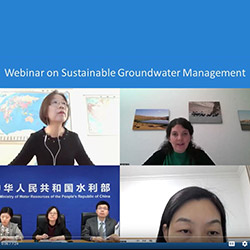 Speakers from China, Switzerland, the Netherlands, and Senegal recently gave a webinar on Sustainable Groundwater Management and Transboundary Aquifer Management which attracted 150 participants from across the continents.
Speakers from China, Switzerland, the Netherlands, and Senegal recently gave a webinar on Sustainable Groundwater Management and Transboundary Aquifer Management which attracted 150 participants from across the continents.
Read the full article about the webinar below or access the recordings
here.
 Liyan Wang
Liyan Wang
Swiss Agency for Development and Cooperation
LinkedIn |
liyan.wang@eda.admin.ch
Read the full article about the webinar
In celebrating the 8+ years Sino-Swiss cooperation project “Rehabilitation and management strategies of over-pumped aquifers in a changing climate”, the Swiss Agency for Development and Cooperation (SDC), the General Institute of Water Resources and Hydropower Planning and Design (GIWP) of the Chinese Ministry of Water Resources, the Centre for Agricultural Research (CAR) of the Chinese Academy of Sciences, in partnership with the
Geneva Water Hub and the
Dakar Water Hub, co-held a Webinar on Sustainable Groundwater Management.
More than 150 participants from different countries attended the webinar. The webinar is co-moderated by Prof. Yanjun Shen of CAR, Jean Willemin of Geneva Water hub and Dr. Liyan WANG of SDC China office.
Counsellor Nadia Benani, Head of SDC China office delivered the opening remark. Switzerland is engaged in the promotion of
global water security, precondition of all societies in fighting poverty and developing sustainably. SDC is active in several countries around the globe in the implementation of the Sustainable Development Goal 6, challenged by overuse of water resources and
climate change.
Video of Nadia
Dr. Paul Pavelic, Senior Researcher of the International Water Management Institute (IWMI), first presented a handful of case studies from India, Thailand, Laos, Vietnam, and Australia. A diverse array of measures have been undertaken to address groundwater overexploitation and water security in different contexts, with adequate scientific evidence showing positive impacts.
Video of Paul’s presentation
Dr. Yu Lili of GIWP shared the results of implementing the Action Plan of Groundwater Overexploitation Control in North China, which has incorporated comprehensive measures in water-saving, groundwater replenishment and legislative framework. At the end of her presentation, she also openly discussed the challenges ahead.
Video of Lili
A group of cross-continental speakers gave a broad view on transboundary aquafer management in this session.
Jean Willemin introduced the session by indicating how water, as a potential source of conflict, can be a vehicle of cooperation, leading to the path of Blue Peace, highlighted by the Global High-Level Panel on Water and Peace. Recommendations of this panel inspired Senegal, Mauritania, The Gambia and Guinea-Bissau to engage on transboundary cooperation on the Senegal-Mauritanian Aquifer Basin.
Video of Jean
Dr. Gabriel de los COBOS, Head of the Geology and Groundwater Section of the Canton of Geneva, shared the 40 years successful cooperation between Switzerland and France. The Genevese Aquifer is the first historical agreement on a transboundary groundwater resource, as well as the pioneer case of artificial recharge management to address groundwater overexploitation.
Video of Gabriel
Mr. Ababacar NDAO, member of
Dakar Water Hub and former Secretary General of Organization for the Development of the Gambia River (OMVG) shared his insights on the gains of 50 years of transboundary cooperation on the Senegal River with (OMVS) and Gambia River with OMVG. With respect to groundwater, the four countries sharing the Senegal-Mauritanian Aquifer Basin have committed to a political process to establish an institutional arrangement, which may set one more example for the world with a case of two transboundary basin organisations supporting states groundwater management.
Video of Ababacar
At the end of this session, Mrs. Elisabeth Lictevout, Director of the International Groundwater Resources Assessment Centre, presented a groundwater paradox case in the arid Northern Chile.
Video of Elisabeth
The final speaker was associate prof. LUO Jianmei of China Geo university. Mrs. LUO elaborated how cropping system, planting structure and water-saving technology may influence the food production in the North China Plain. Her presentation shed light on how to find balance between food security and water resources from a long-term perspective.
Video of Jianmei
At the end of the Webinar, Mrs. WANG Jinsu, Director of the Department of the International Cooperation, Science and Technology of the Chinese Ministry of Water Resources, made a concluding remark, confirming the fruitful results generated in the Sino-Swiss cooperation, as well as from the webinar.
Video of Jinsu
#SaveSoil for healthy food systems
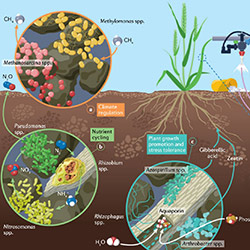 A cornerstone of sustainable agriculture is the proper stewardship of soil.” These are poignant words from the new Nature Review article ‘Soil structure and microbiome functions in agroecosystems’ by ETH Zürich researchers Johan Six and Martin Hartmann.
A cornerstone of sustainable agriculture is the proper stewardship of soil.” These are poignant words from the new Nature Review article ‘Soil structure and microbiome functions in agroecosystems’ by ETH Zürich researchers Johan Six and Martin Hartmann.
The review describes the links between the soil microbiome, soil structure and agricultural management practices. Further, it outlines how increasingly mechanized and intensified agriculture can disturb soil and lead to severe changes in the structure.
Read the article
 World Food System Center, ETH Zurich
World Food System Center, ETH Zurich
LinkedIn |
wfsc@ethz.ch
Events
Little animals - big impact: How nematodes & insects can improve smallholder yields
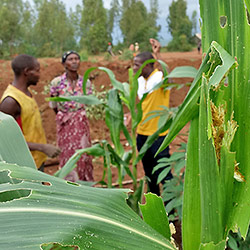 ETH Zurich | 15 December | 16:15 – 18:40 CET
ETH Zurich | 15 December | 16:15 – 18:40 CET
Beneficial nematodes and insects have the potential to protect plants against pests or improve soil fertility. The SFIAR Award Ceremony will present examples and discuss how to upscale them in favor of smallholders in developing countries.
Find out more and register here
FSLJ – Region N°1: West Africa | Focus Climate Change
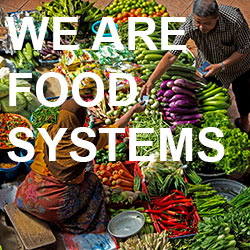 Webex | 20 December | 10 – 11:30 CET
Webex | 20 December | 10 – 11:30 CET
In this session, following the first regional workshop on our Food Systems Learning Journey which took place in Bamako, we will have a look at Food Systems in the region of West Africa and the impacts and interrelatedness of climate change on food systems.
Sign up here and join in
Thoughts for Food
 Webex | 11 January 2023 | 08.15 – 09.00 CET
Webex | 11 January 2023 | 08.15 – 09.00 CET
The next Thoughts for Food meeting will be held on 11 January. In this informal session we will share some thoughts for food with network members and anyone else interested, get an overview of new findings in the area of food systems, and deep dive into two specific topics. There will also be space for discussion and exchange with other participants. Join us to feed your brain with some thoughts for food!
Learn about the event
Who is who
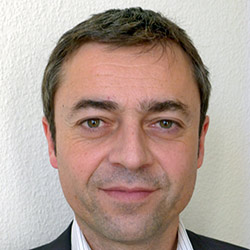
Manfred Kaufmann
Senior Advisor,Swiss Agency for Development and Cooperation, Section Food Systems, Bern, Switzerland
What do you love, or what is special, about your work?
I like nature and I am passionate about the preservation of the environment. I feel privileged to be able to bring in these values and interests also in my work at SDC and to contribute to a nature-positive and pro-poor food systems transformation in line with agroecological principles.
What is your favourite quote and why?
"Be the change you wish to see in the world" by Mahatma Gandhi. Because change will only happen if everybody is ready to play his part and to walk the talk.
What is the most important lesson you have learned from your work?
Be ambitious in your objectives, but be humble, patient, adaptive and responsive on the way to reach them.
Manfred joined SDC in 2008 and has worked, so far, in the thematic sections on water, climate change and environment and now in food systems. He graduated in environmental sciences and completed his studies with a PhD in soil science at ETHZ. Before joining SDC, he worked in environmental consulting and at the Centre for International Agriculture at ETHZ. Manfred has more than 20 years of experience in agricultural research for development, adaptation to climate change, disaster risk reduction and transboundary water cooperation.
Comic
